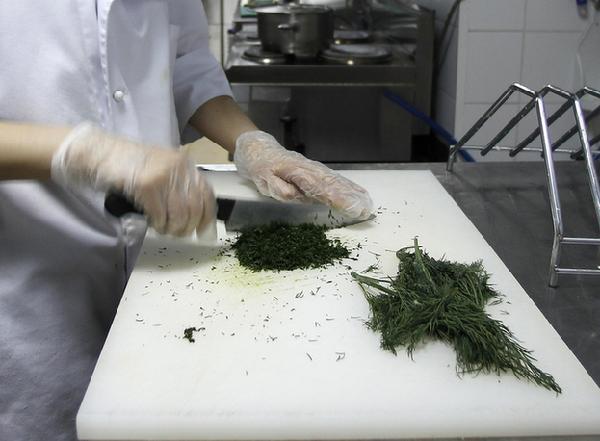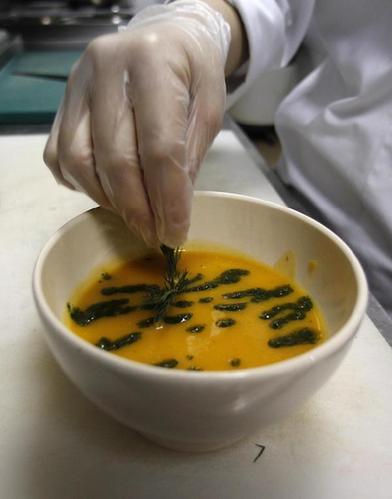Russia's love affair with dill more than a sprinkle
Updated: 2011-07-27 11:13
(Agencies)
|
|||||||||||
MOSCOW - Sprinkled on almost every dish, grown by old ladies in their homes and boiled to combat sweating: the herb dill is a matter of Russian national pride.
Pungent and strong-tasting, the Russian love for the spindly herb appears to know no bounds, bewildering foreigners who are not used to such heavy use.
Russian cuisine is so tightly tied to dill that its Russian name 'ukrop' can be traced to the word 'kropit', meaning 'to sprinkle'.
Dill has also begun to appear on non-Russian dishes, often spotted coating the feta of a Greek salad in cafes and supermarkets, and giving a traditional flavour to omelettes and even pizzas at eateries across the Russian capital.
 |
|
A cook chops dill at a restaurant in Moscow July 20, 2011. Sprinkled on almost every dish, grown by old ladies in their homes and boiled to combat sweating: the herb dill is a matter of Russian national pride. [Photo/Agencies] |
 |
|
A cook adds dill into a dish at a restaurant in Moscow July 20, 2011. Sprinkled on almost every dish, grown by old ladies in their homes and boiled to combat sweating: the herb dill is a matter of Russian national pride. [Photo/Agencies] |
Russians say its ubiquity has left them inured to the taste.
According to one of Russia's oldest and largest greenhouse providers, Agrotip, the average Russian consumes 1.6 kg (3.5 lbs) of dill a year -- about enough to fill a large suitcase.
"I guess compared to other European countries, Russia eats the most dill. We have no export markets," said Agrotip operations manager Olga Antipova.
But Russians believe the real amount of dill an average Russian eats is much more as the figure does not include the copious amounts of it grown in their gardens and homes, used atop beetroot soup, Siberian pelmeni dumplings and salads.
Mentioned in the Bible for its medicinal qualities, dill is a regular feature in Russian herbal anthologies, which recommend it for gastritis, insomnia and tension of the arteries.
Russian TV celebrity Mikhail Grebenshikov promoted dill on state TV earlier this month, urging Muscovites to boil large bunches of it for their showers to combat sweating.
"It's summer. Sun and heat! People are sweating. But I don't have that problem. My secret -- it's in dill," a shirtless Grebenshikov said on the popular First Channel before dousing himself in the mixture.
"DILL PLAGUE"
Andrea Maestrelli, an Italian chef in charge of Research and Development at Rosinter, Russia's largest chain of restaurants, put dill's popularity down to "being very easy to grow. It's the most widespread product available in Russian fields".
But foreigners are growing increasingly hostile to this Russian obsession, and some have even set up a Facebook group -- Dillwatch -- where its over 120 members can post pictures of "inappropriate" uses of dill in Russian restaurants.
"I don't think there is a Westerner in Russia who hasn't noticed the dill plague... Most people find it an inconvenience at best," said British journalist Shaun Walker, who founded Dillwatch in January.
"Five years ago, dill would be everywhere on travels around the Russian provinces, but in posh Moscow restaurants you would never find it. Recently, though, I feel there has been a definite increase in indiscriminate dill use," Walker said.
Le Pain Quotidien, a Belgian bakery and cafe chain that caters to foreigners in Moscow, is regularly featured on Dillwatch, with posted pictures of dill atop humus and gazpacho.
Yevgenia Zinets, who manages one of their 11 Moscow branches, denied the widespread use of dill but did say it is scattered in plenty over omelettes and placed in pumpkin soup.
But for Russians it remains innocuous. "We eat a lot of it as it's so tasty and good for you, and growing it is a must," said Yelena Garan, 28, a project manager from St Petersburg.